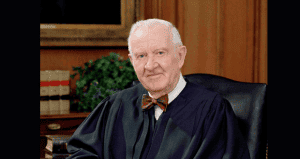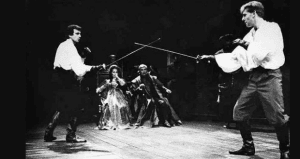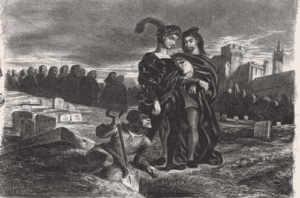
Tom Regnier Centennial Presentation, March 4, 2020
by Bryan H. Wildenthal May 27, 2020 — The late Tom Regnier’s Centennial Symposium presentation, “Justice Stevens, the Law of Evidence, and the Shakespeare
Exploring the evidence that the works of Shakespeare were written by Edward de Vere, 17th Earl of Oxford
The history of scholarship on the way Shakespeare employs legal terminology and concepts is complex, controversial, and closely tied to the authorship question. Adherents of the traditional view of authorship traditionally deprecate Shakespeare’s alleged knowledge of the law, while often simultaneously invoking all sorts of unsupported theories about how the author might have acquired this knowledge. Legal experts, on the other hand, argue that Shakespeare’s legal knowledge is acutely honed and precise — and that it indicates a mind well-trained and practiced in the idioms and conceptual habits characteristic of lawyers and judges. For example, Shakespeare’s Legal Language: A Dictionary by Sokol and Sokol, published in 2000 in the Athlone Shakespeare Dictionary Series fills over 400 pages with detailed discussion of Shakespeare’s legal terms and concepts.
Browse our articles on Shakespeare and the Law.

by Bryan H. Wildenthal May 27, 2020 — The late Tom Regnier’s Centennial Symposium presentation, “Justice Stevens, the Law of Evidence, and the Shakespeare

The Shakespeare Oxford Fellowship and the authorship question receive lively coverage in the latest issue of The New Yorker, one of America’s more venerable periodical

by Tom Regnier July 17, 2019 We in the Shakespeare Oxford Fellowship note with great sadness and enormous respect the passing of retired Supreme Court

by Tom Regnier Originally published in Brief Chronicles, v. 3 (2011), pp. 107–32 (PDF version here); republished on the SOF website Aug. 17, 2017 (updated

Justice Antonin Scalia (1936–2016), Justice John Paul Stevens (1920–2019), and Other Authorship Skeptics on America’s Highest Court by Bryan H. Wildenthal Published on the SOF website

Supreme Court Justice Stevens addresses the search for truth and justice by discussing the view that Edward de Vere, the 17th Earl of Oxford is the true author of the Shakespeare Canon and how that view may help understand statutory construction.

Noted lawyer Sir George Greenwood claimed Shakespeare’s plays and poems “supply ample evidence that their author . . . had a very extensive and accurate knowledge of law.” This essay surveys arguments for and against supposing a legal education for Shakespeare.

by Thomas Regnier. Shakespeare’s frequent use of the law is well documented. Whether his legal terms are always used correctly has been a matter of dispute. I examine how accurately legal terms are used in the plays, and how accurately and deeply legal issues are developed.

by J. Anthony Burton. The subject of inheritance is the principal idea behind several important scenes, including the nature of the disappointed “hopes” Hamlet includes, along with murder, incest, and attempted murder, in his list of justifications for killing Claudius

by J. Anthony Burton Part II (published in the Shakespeare Newsletter of Claremont McKenna College, Volume 50, No. 4 Winter 2000–01; reprinted on the SOF

by J. Anthony Burton. The theme of lost inheritance has a special but limited function within the larger framework of the play. It does not, of course, displace or even compete with the central theme of revenge or, more properly, justice. Inheritance works as a sort of unifying preoccupation

by Mark Alexander. A look at the history and scholarship on Shakespeare’s knowledge of the law. Alexander’s analysis reveals Shakespeare’s legal knowledge is sophisticated and deep, and that it is his critics who’ve got it wrong.

by Mark Alexander. A scene by scene analysis of legal themes and allusions in Shakespeare’s Hamlet.
| Cookie | Duration | Description |
|---|---|---|
| cookielawinfo-checkbox-analytics | 11 months | This cookie is set by GDPR Cookie Consent plugin. The cookie is used to store the user consent for the cookies in the category "Analytics". |
| cookielawinfo-checkbox-functional | 11 months | The cookie is set by GDPR cookie consent to record the user consent for the cookies in the category "Functional". |
| cookielawinfo-checkbox-necessary | 11 months | This cookie is set by GDPR Cookie Consent plugin. The cookies is used to store the user consent for the cookies in the category "Necessary". |
| cookielawinfo-checkbox-others | 11 months | This cookie is set by GDPR Cookie Consent plugin. The cookie is used to store the user consent for the cookies in the category "Other. |
| cookielawinfo-checkbox-performance | 11 months | This cookie is set by GDPR Cookie Consent plugin. The cookie is used to store the user consent for the cookies in the category "Performance". |
| viewed_cookie_policy | 11 months | The cookie is set by the GDPR Cookie Consent plugin and is used to store whether or not user has consented to the use of cookies. It does not store any personal data. |